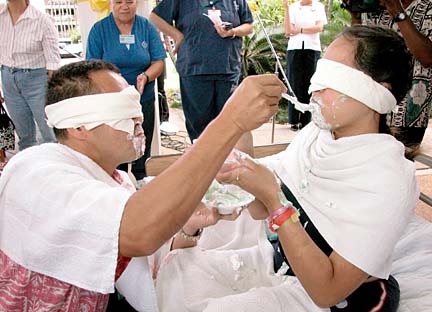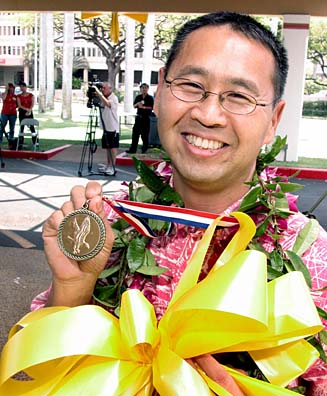
Dr. Craig Ono and patient Kaiulani Cabarloc fed each other whipped cream yesterday during a pie-eating contest at Shriners Hospital. The doctor was deployed to Iraq in December and came home a few weeks ago.
Shriners lauds doctor
back from warThe Army surgeon says wounded
Iraqis received first-rate care
U.S. Army doctors cared for Iraqi casualties with the same diligence as they did for wounded U.S. soldiers, said an Army Reserve physician back from Iraq.
Dr. Craig Ono, an orthopedic surgeon at Shriners Hospital for Children, spent 90 days in a forward surgical hospital supporting the 3rd Armored Calvary Regiment.
He left Iraq at the end of March, just before the bloodiest fighting began.
"The perception then was that our mission was going well," said Ono, who served in Saudi Arabia during the 1991 Gulf War. "We didn't see a lot of U.S. casualties. ... I felt good being there."
Ono, 46, said he was on call seven days a week, 24 hours a day as the unit's only orthopedic surgeon.
"We also took care of Iraqi casualties. ... I guess they call them enemy combatants," said Ono. "They got hurt because they were fighting our troops. We didn't treat them any differently than U.S. soldiers."
Dr. Craig Ono holds up the "medal of honor" given to him by Shriners Hospital staff and patients for his service in Iraq.
Ono said Army Reserve doctors serve a 90-day active-duty tour."I think this is a retention issue," said Ono. "During Desert Storm the doctors were kept on active duty for a long time. It made it hard for physicians to leave their practices."
He was honored by Shriners yesterday for his service.
"You are a hero," said Tom Schneider, Shriners administrative officer, before he cut one of the yellow ribbons tied to a pillar at the hospital's entrance. "Welcome home."
Ono said he was assigned to the forward surgical hospital at Al Asad Air Base in a remote area 180 miles west of Baghdad.
"It is completely staffed by reservists," he said.
There are two operating beds and six intensive care beds there.
"However, the patients generally only spend six to eight hours there before they are transferred," Ono said. "It's basically an emergency and trauma room operation where the patients are stabilized."
Ono said most of the cases he saw were vehicle accident victims -- "nothing much different than what you would see in ER here."
But he also treated soldiers who were injured from roadside bomb blasts. "Most of it were shrapnel wounds to the head and the face," Ono said.
Married for 22 years and with three daughters, Ono said he is off the deployment roster for a year.
However, his unit -- the 1984th U.S. Army Reserve Hospital at Tripler Army Medical Center -- just sent two doctors to Iraq from Maui.
Ono, a colonel, was on active duty for 15 years and was deployed to Saudi Arabia during the 1991 Gulf War. After Desert Storm he commanded the 250th Forward Surgical Team when it was sent to Kosovo for six months.

